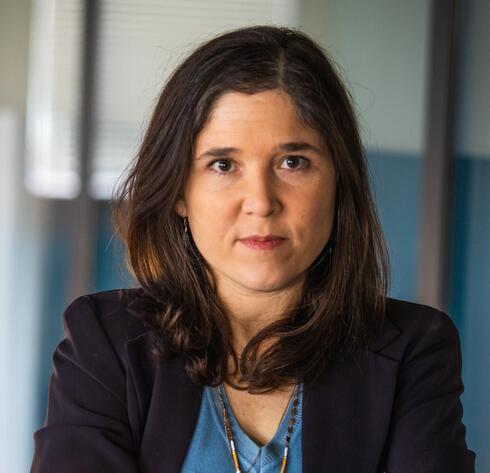
“How much did my sister’s murder cost?” $2.2 million, says report on economic cost of femicide
A groundbreaking report commissioned by the Michal Sela Forum and conducted by Social Finance Israel reveals that intimate partner violence and femicide cost the Israeli economy approximately NIS 34 billion ($9.35B), with NIS 8.2 million ($2.2 million) per murdered woman. Forum CEO Lili Ben-Ami, whose sister Michal Sela was murdered by her husband, says that prioritizing preventative solutions would save lives and cut public costs.
On October 3, 2019, Michal Sela, a social worker for at-risk youth in Jerusalem, tried to leave her husband. While he had never harmed her physically, he was emotionally abusive, obsessive and paranoid. Not for the first time, Michal expressed her desire to end their relationship.
Her husband responded by ripping a closet door off its hinges and beating her with it, before stabbing her eleven times with a knife, all in the presence of their infant daughter. He waited in the house for seventeen hours as she bled to death. Michal was thirty-two.
In the five years since she was killed, Michal’s sister, Lili Ben-Ami, has devoted her life to understanding what led to her sister’s murder and how to prevent the wider phenomenon of intimate partner violence (IPV) and femicide. She established the Michal Sela Forum in Michal’s memory to study the subject and focus on preventative solutions, including by spearheading hackathons and tech accelerators.
“I didn’t know how something like this could have happened,” says Ben-Ami. “I wanted to understand how I could have saved her or what we could have done to prevent her death.”
She learned that of the NIS 200 million ($54 million) spent per year by the state on addressing domestic violence, only 1.4% of it goes to prevention, with the vast majority spent only after a crime has already been perpetrated including emergency response, shelters, and law enforcement.
“This doesn’t make any sense. Half of the women who are murdered, including my sister, never experience physical violence before the murder. How was she supposed to know that she was in danger? We need to do something different,” she says.
The emotional price of Michal’s murder for her and the rest of her family is infinite and unquantifiable, but Ben-Ami wanted those who didn’t know her, especially those in power, to understand her loss in a tangible way. “I wanted to know the exact economic cost of my sister’s murder and for femicide as a greater phenomenon. I thought that maybe if I could show this to decision makers, I could convince them to put money towards prevention,” she says.
According to a new report commissioned by Ben-Ami and the Michal Sela Forum, entitled ‘Estimating the economic cost of intimate partner violence in Israel,’ the total cost of the phenomenon is a staggering NIS 34 billion ($9.3 billion). The forum enlisted researchers from Social Finance Israel (SFI), an impact investment non-profit, to carry out the research, and received funding from tech company Fiverr.
The key findings of the report - the first of its kind in Israel - include that costs of IPV to the state are NIS 451,000 ($123,000) over the duration of the abuse, while expenses associated with every murder victim is NIS 8.2 million ($2.2 million). The calculated costs include legal proceedings, healthcare, mental health treatment, welfare, employment loss, and childcare.
When factoring in additional intangible costs including pain, suffering and expenses for addressing the needs of the children of victims, the total amount is estimated to be significantly higher: NIS 730,000 ($200,000) - NIS 1.5 million ($412,000) per survivor for the duration of the abuse and NIS 13.7 ($3.7 million) - NIS 16.2 million ($4.4 million) for every murdered woman.
One of the most shocking findings of the report is the share of the economic burden borne by the public, and how much of that is actually spent on services for victims. Roughly 57% of the expenses associated with femicide are borne by the public, nearly all of which goes to law enforcement and incarceration of the perpetrator, as well as loss of productivity.
For IPV survivors, 40% of the associated costs are borne by the public. Most of these public funds (60%) go to enforcement and incarceration, with physical and mental health care for the victims accounting for only 27% of total costs, and welfare responses for victims constituting only 8%.
The report illuminates that not only is the public bearing a large portion of the financial burden of IPV, and the vast majority of the economic costs of femicide, but the lion’s share of that funding isn’t going to prevention or even to caring for the victims but prosecuting, incarcerating, and treating the perpetrators.
Eradicating femicide
The number of victims of IPV in Israel is estimated to be between 149,700-160,100, however, the report emphasizes that these figures are highly conservative and that numbers are likely much higher. The Central Bureau of Statistics estimates that 59% of victims of IPV or women threatened with IPV don’t report it – a figure that rises to 84% when sexual violence is involved. According to the new report, there is “a troubling gap between the actual prevalence of violence against women and the cases known to authorities,” says Achinoam Zigel, Senior Director of Economics and Finance at SFI.
Ben-Ami says that in Israel, where the last comprehensive report on domestic violence was conducted in 2001, data on domestic violence remains "primitive." According to the Michal Sela Forum, from October 7, 2023 until October 7, 2024, 18 women were murdered in domestic violence incidents, 14 by their partners, marking a 17% increase compared to the same period last year.
In an effort to inform the public of the widespread nature of the phenomenon and motivate policy changes, similar reports measuring the economic cost of domestic violence have been conducted in numerous OECD countries over the last twenty years, primarily in Europe and North America. “Until now, the discussion around domestic violence in Israel has been framed in moral or ethical terms,” says Yaron Neudorfer, CEO of SFI. “This is the first time that it is being discussed in Israel from an economic perspective, showing what it costs the public.”
For Ben-Ami, this report is one step in her goal of eradicating femicide. On Monday, she’ll appear before the Knesset Committee for the Advancement of Women led by MK Pnina Tamano-Shata to present the report and its findings. Her goal is to convince decision makers of the economic and social urgency of prioritizing prevention.
“I want at least a third of the budget for domestic violence to be focused on preventative solutions,” she says. “It doesn’t make sense that in 2024 the only solution is to fund shelters for victims. These are, of course, important, but we also need to use all of our resources to stop this in the first place.”
According to her vision, domestic violence should be treated as a national health and security issue and prioritized in the same way that terrorism is. She believes a centralized body is essential to focus on the issue, oversee prevention efforts, and mobilize state resources to implement solutions.
“My dream is that no women will be beaten or murdered in their homes by the person who is supposed to keep them safe. One day, society will look back at this time in the same way that we look at slavery or corporal punishment, and ask, ‘How was this ever allowed?’”


















